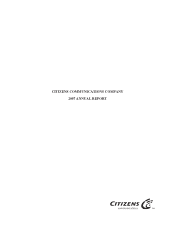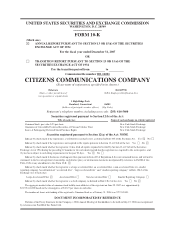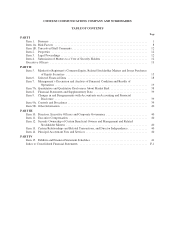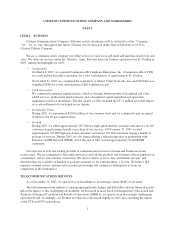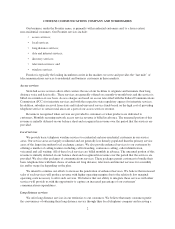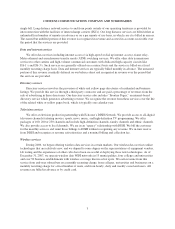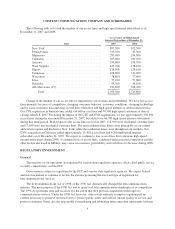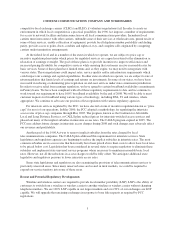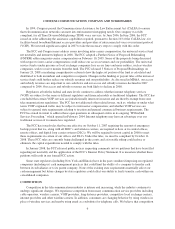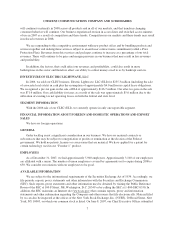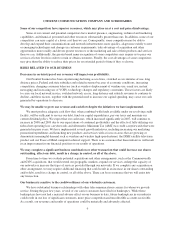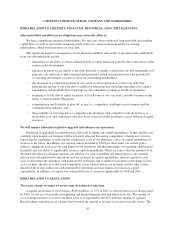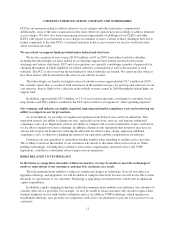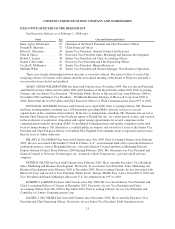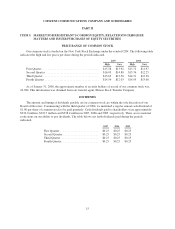Frontier Communications 2007 Annual Report Download - page 10
Download and view the complete annual report
Please find page 10 of the 2007 Frontier Communications annual report below. You can navigate through the pages in the report by either clicking on the pages listed below, or by using the keyword search tool below to find specific information within the annual report.CITIZENS COMMUNICATIONS COMPANY AND SUBSIDIARIES
In 1994, Congress passed the Communications Assistance for Law Enforcement Act (CALEA) to ensure
that telecommunication networks can meet law enforcement wiretapping needs. Our company was fully
compliant, for all Time Division Multiplexing (TDM) voice services, by June 2006. In June 2006, the FCC
issued an order addressing the assistance capabilities required, pursuant to Section 103 of the CALEA law, for
facilities-based broadband Internet access providers and providers of interconnected voice over internet protocol
(VOIP). We invested significant capital in 2007 to take the necessary steps to comply with this order.
The FCC and Congress may address issues involving inter-carrier compensation, the universal service fund
net neutrality and internet telephony in 2008. The FCC adopted a Further Notice of Proposed Rulemaking
(FNPRM) addressing inter-carrier compensation on February 10, 2005. Some of the proposals being discussed
with respect to inter-carrier compensation could reduce our access revenues and our profitability. The universal
service fund is under pressure as local exchange companies lose access lines and more entities, such as wireless
companies, seek to receive monies from the fund. The FCC released 3 Notices of Proposed Rulemakings on
January 29, 2008 considering comprehensive reform to how the high-cost portion of the fund is calculated and
distributed to both incumbent and competitive recipients. Changes in the funding or payout rules of the universal
service fund could further reduce our subsidy revenues and our profitability. As discussed in MD&A, our access
and subsidy revenues are important to our cash flows and our access and subsidy revenues declined in 2007
compared to 2006. Our access and subsidy revenues are both likely to decline in 2008.
Regulators at both the federal and state levels continue to address whether internet telephony services
(VOIP) are subject to the same or different regulatory and financial models as traditional telephony. The FCC has
concluded that certain VOIP services are jurisdictionally interstate in nature and are thereby exempt from state
telecommunications regulations. The FCC has not addressed other related issues, such as: whether or under what
terms VOIP originated traffic may be subject to intercarrier compensation; and whether VOIP services are
subject to general state requirements relating to taxation and general commercial business requirements. The
FCC has stated its intent to address these open questions in subsequent orders in its ongoing “IP-Enabled
Services Proceeding,” which opened in February 2004. Internet telephony may have an advantage over our
traditional services if it remains less regulated.
The FCC has issued rules that became effective on October 11, 2007 requiring the amount of emergency
backup power that we, along with all ILEC’s and wireless carriers, are required to have at its central offices,
remote offices, and digital loop carrier systems (DLCs). We will be required to invest capital in 2008 to meet
these requirements in certain of our offices and DLCs. Under the rules, we must be compliant by October 11,
2008. These FCC rules are currently being challenged in the courts and a favorable ruling could reduce or
eliminate the capital expenditures needed to comply with the rules.
In January 2008, the FCC released public notices requesting comments on two petitions that have been filed
regarding net neutrality and the application of the FCC’s Internet Policy Statement. It is uncertain whether these
petitions will result in any formal FCC action.
Some state regulators (including New York and Illinois) have in the past considered imposing on regulated
companies (including us) cash management practices that could limit the ability of a company to transfer cash
between its subsidiaries or to its parent company. None of the existing state requirements materially affect our
cash management but future changes by state regulators could affect our ability to freely transfer cash within our
consolidated companies.
COMPETITION
Competition in the telecommunications industry is intense and increasing, while the industry continues to
undergo significant changes. We experience competition from many communication service providers including
cable operators, wireless carriers, VOIP providers, long distance providers, competitive local exchange carriers,
internet providers and other wireline carriers. In addition, consumers are changing behavior by using wireless in
place of wireline services and maybe using email as a substitute for telephone calls. We believe that competition
6

